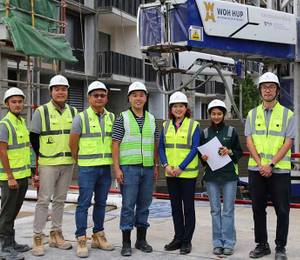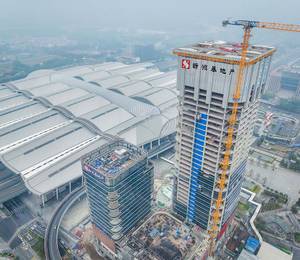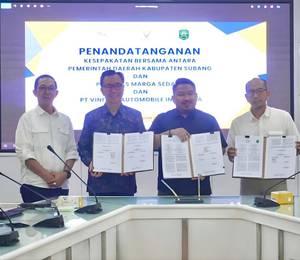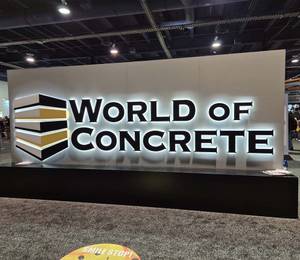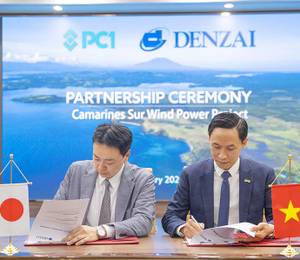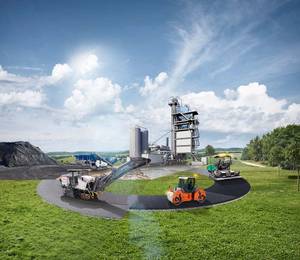Two Eurotec ECO120 concrete batching plants, along with a CIP12 chilled water plant and a SIM40 flake ice plant, have been installed to support work on a 16 km section of the Malolos-Clark Railway Project (MCRP) in the Philippines. The 53.1 km MCRP will leverage cutting-edge technology to create an elevated railway – to minimise disruption and flood risks in local communities – and provide the first rail link to connect major cities in the Central Luzon region with Clark International Airport, approximately 90 km north of Manila.
The PHP 33.7 billion Package 2 section contract was awarded to a joint venture of Acciona Construction Philippines and the South Korean group Daelim Industrial. As Acciona’s largest-ever contract in the country, with a total of 6,186 45-t and 2.5-m-long precast segments required, the ability to consistently produce large volumes of high-strength and low-temperature concrete in such a humid climate was crucial.
‘High demand and tough conditions’
The Eurotec plants’ installation at Clark and San Fernando, Pampanga (at either end of the section) was concluded earlier this year to support the construction of a 16 km viaduct, tunnel cut and cover, and three stations in Minalin, Santo Tomas and San Fernando. Several months later, the plants are already proving its ability to handle a combination of high demand and tough working conditions, according to Jose Luis Masero, plant and equipment manager at Acciona Construction Philippines.
“The Eurotec plants are in daily operation, usually 12 hours a day,” he explained. “It’s not unusual for both of the ECO120 plants to be operating at maximum capacity.”
As the largest capacity plant in the ECO series, the ECO120 produces up to 120 cu m/hr of ready-mix concrete in 3 cu m batches, accurately weighing up to 2,000 kg of cement and 750 kg of water at a time with the aid of load cells. This is then efficiently blended using an extremely durable and efficient twin-shaft mixer under the guidance of a user-friendly process control system to guarantee a repeatable, consistent mix.
“Due to the very hot weather where the average daytime temperatures in the region rarely drop below 30°C, one of the most critical aspects was ensuring we meet the temperature requirements for consistent concrete production,” added Mr Masero. “That was why we also installed Eurotec chilled water and flake ice plants on site.”
Accompanied by two Eurotec chilled water storage tanks and one automatic ice-storage system, the chilled water plant and flake ice plant provide enough capacity to support both the ECO120 concrete batching plants. The ice plant can produce up to 40 t of flake ice daily.
With a lower melting point than other forms of ice, flake ice produces a huge cooling energy, melting quickly to ensure there are no delays during mixing. And, by resisting sticking together during transportation and storage, no large ice particles are introduced into the mix, avoiding the risk of voids leading to rejected concrete.
Portable water chilling system
Eurotec’s portable water chilling system delivers an easy method to provide chilled water for concrete batching work in hot climates, in ambient temperatures up to 46°C.
Using an evaporative condenser and multi-stage cooling process reduces energy consumption by 25% over the competition, while the water-circulation system facilitates continuous recycled water use. The chilled water and flake ice plants are fully automatic and built within containerised structures, offering operating and transport benefits.
“It’s extremely gratifying to see our plants performing so reliably in these difficult conditions,” said R. Sakthi, CEO of Lintec & Linnhoff Concrete. “We are happy that we met our customer’s project demands as well as the expectations of the local team in terms of the quality, performance and reliability of their purchase.
“Although this is the first time Acciona has used Lintec & Linnhoff plants in the Philippines, they were already fully aware of the excellent reputation of Eurotec batching plants and the high level of after-sales support we offer in the country.”
The Eurotec plants will likely remain on site for the rest of the project’s three or four years, which has already seen progress delayed by restrictions on access and rights of way.
This will be the second section of the MCRP to be built by Acciona, which has already secured the €330 million contract to construct the final 6.5 km of access to Clark International Airport (CRK). When complete, the new rail line’s planned 160 km/hr maximum speed should significantly reduce journey times between Manila and CRK. The current three-hour journey by public bus services is expected to be reduced to just one hour by rail, reducing greenhouse gas emissions by more than 60,000 t annually.
As the most significant project to be financed by the Asian Development Bank (ADB) in the Philippines, the MCRP forms a vital part of the 147-km-long North-South Commuter Railway (NSCR) initiative, which will link 26 cities and towns across Central Luzon, NCR, and Calabarzon.

